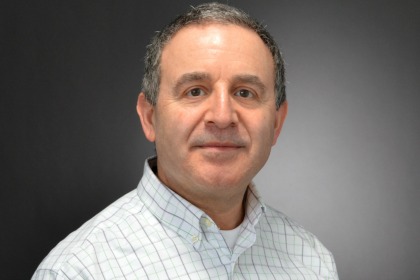To neuroscientist Anthony Morielli, Ph.D., the study of the brain opens a window to better understand the way the world works.
“The brain is the one thing in the universe that can reflect back on itself,” says Morielli, a University of Vermont associate professor of pharmacology, who was recently named director of UVM’s Neuroscience Graduate Program.

Anthony Morielli, Ph.D., UVM Professor of Pharmacology and Director, Neuroscience Graduate Program (Photo: COM Design & Photography)
To neuroscientist Anthony Morielli, Ph.D., the study of the brain opens a window to better understand the way the world works.
“The brain is the one thing in the universe that can reflect back on itself,” says Morielli, a University of Vermont associate professor of pharmacology, who was recently named director of UVM’s Neuroscience Graduate Program.
Neuroscience research sheds light on a wide range of conditions, including depression and multiple sclerosis, or Morielli’s specialty area – the cellular and molecular mechanisms of nervous system activity related to learning and memory. The scientific knowledge gained from this work helps to inform ways to address problems and improve human lives.
Morielli is one of 54 faculty members across nine departments and four colleges in the 10-year-old Neuroscience Graduate Program (NGP), which is jointly run by the College of Medicine and Graduate College. The program includes about 25 doctoral students who work on research projects in the labs of 48 faculty mentors, sometimes collaborating with more than one.
“The whole purpose of NGP is to break down barriers between departments and even programs,” he says. “It’s all about flexibility, about being really open-minded, about opportunities – not limiting things at all.”
As NGP director, Morielli hopes to involve more faculty and students in governance of the program. One way to do this, he says, is through the NPG committees, which include curriculum, admissions and tracking, a committee that follows students to ensure they are consistently supported and able to meet requirements.
The NGP recently added a student to the admissions committee, which Morielli chaired before becoming director. To attract the best possible candidates to the program, the insights of existing students are valuable, he says. He also believes that the curriculum committee could benefit from student input.
To encourage more faculty to serve on committees, Morielli is considering a rotation for membership.
“This new approach will create a greater sense of ownership among faculty and students, enhance participation in the program at all levels and thereby maximize our ability to work as a team to navigate the challenges ahead,” the director wrote in his application.
Morielli earned his Ph.D. in biology from the University of California, Santa Cruz. During his postdoctoral training at Stanford University and Harvard University, he studied the regulation of ion channels – proteins that allow charged particles to pass through the cell membrane. In 1999, he joined the UVM Department of Pharmacology, and focused on the interaction of these channels in the process of learning and consciousness, particularly in the brain’s cerebellum, which controls Pavlovian-type learning – an automated response to stimulus. In this area, he has worked on several projects and written grants in collaboration with John Green, Ph.D., UVM associate professor of psychological sciences, who specializes in neurobiology of learning and memory.
As NPG director, Morielli would like to better help prepare students for professional opportunities outside of academia. The NGP has long helped students pursue a traditional academic research path but has offered less direction for careers in the private sector or government agencies, he says. The NPG could invite experts, for example, from the biotechnology industry in Boston and elsewhere to talk to students about working in that field, he says.
“We used to call those ‘alternative’ career paths,” Morielli says, “but they’re no longer alternative.”
Learn more about UVM’s Neuroscience Graduate Program.